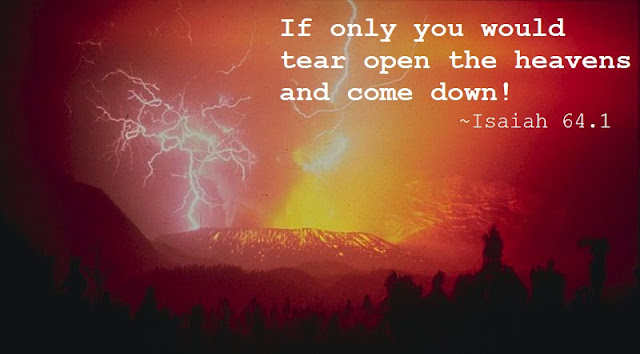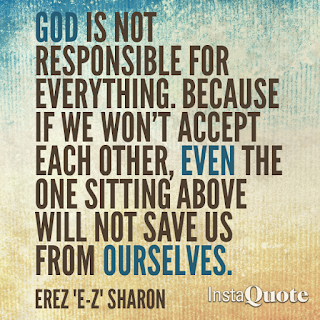What are we waiting for?
Isaiah 64: 1-9*
New Ark United Church of Christ, Newark, DE
December 3, 2017
Isaiah had me at “If only you would tear open the heavens and come down”. O God, if only you would tear open the heavens and come down into this hot mess of a tax bill. Isaiah had something to say about it in chapter 10: “Woe to those who make unjust laws, to those who issue oppressive decrees, to deprive the poor of their rights and withhold justice from the oppressed of my people.” If only you would tear open the heavens and come down into workplaces and school yards and town halls and faith communities and all the marginal places, that every person no matter their gender or sexuality or religion or skin color or age or ability would be treated with respect and dignity. If only you would tear open the heavens and come down into one of the richest nations in the world so that 41 million of its people would be lifted out of poverty and the rich sent away empty. If only you would tear open our hearts and come down and knock some sense and compassion into not just our elected leaders but all of us who put them there.
How would you finish it? If only you would tear open the heavens and come down… (Put your answer in the comments.)
When it comes to power struggles, and we are in the midst of a knock-down-drag-out power struggle, Isaiah knows it full well. Israel had been sacked by the Babylonian empire and taken some of Israel’s people as spoils of war. In its weakened state, the rest of Israel was taken over by Persia. Now the exiles are returning home. Those who had been left behind had made their own way under Persian occupation. Can you see the conflict coming? It’s nothing short of the backstory of the prodigal son and his older brother, but each side thinks they are the righteous older brother. And so Isaiah calls on God: if only you would tear open the heavens and come down and settle this. Show your stuff like you used to. Let us know who’s the boss. Make the nations shake in their boots. If only.
Like many peoples of the Iron Age, if things were going badly, it was believed to be punishment from the heavens for humanity’s wicked behavior. While we think we are so far from such thinking, we still believe in a “you get what you deserve, you made your bed—now lie in it” kind of karma-ordered universe. And even though our rational minds tell us that a supernatural, interventionist divine being makes no logical sense, those are exactly the kind of prayers we make when life is hitting the deep skids. “If only you would tear open the heavens and come down!” If only.
And those are the telling words of this passage. If only. Isaiah knows that God is not going to tear open the heavens and come down. Nor is this about God tearing open the heavens with angels singing or Mary conceiving or Joseph dreaming. This is a passage about waiting and about hope. About waiting with hope. Hopeful that the mystery that created us is still shaping us—each and every one of us. Hopeful that no matter what we do to each other, we can’t hold onto each other’s wrongs forever. Hopeful that we are still one people, no matter what we’ve allowed to separate us from one another. Hopeful that when we acknowledge we are powerless against much in this universe, we are set free.
The wonderful irony about hope is that it asks us to surrender: surrender our individual expectations and our fear of change, surrender our striving so hard to be good and righteous and enlightened and better than, surrender our notions about how and when the holy should break into the daily, surrender our dread, our desperation, our despair.
Hope is what led to the civil rights movement, to marriage equality, to the end of apartheid, and the fall of the Berlin Wall. Hope was and is the main course at this Table: hope that death and violence and injustice do not have the last word. What are we waiting for? The hope that one day we will rise yet again. Amen.
New Ark United Church of Christ, Newark, DE
December 3, 2017
Isaiah had me at “If only you would tear open the heavens and come down”. O God, if only you would tear open the heavens and come down into this hot mess of a tax bill. Isaiah had something to say about it in chapter 10: “Woe to those who make unjust laws, to those who issue oppressive decrees, to deprive the poor of their rights and withhold justice from the oppressed of my people.” If only you would tear open the heavens and come down into workplaces and school yards and town halls and faith communities and all the marginal places, that every person no matter their gender or sexuality or religion or skin color or age or ability would be treated with respect and dignity. If only you would tear open the heavens and come down into one of the richest nations in the world so that 41 million of its people would be lifted out of poverty and the rich sent away empty. If only you would tear open our hearts and come down and knock some sense and compassion into not just our elected leaders but all of us who put them there.
How would you finish it? If only you would tear open the heavens and come down… (Put your answer in the comments.)
Like many peoples of the Iron Age, if things were going badly, it was believed to be punishment from the heavens for humanity’s wicked behavior. While we think we are so far from such thinking, we still believe in a “you get what you deserve, you made your bed—now lie in it” kind of karma-ordered universe. And even though our rational minds tell us that a supernatural, interventionist divine being makes no logical sense, those are exactly the kind of prayers we make when life is hitting the deep skids. “If only you would tear open the heavens and come down!” If only.
And those are the telling words of this passage. If only. Isaiah knows that God is not going to tear open the heavens and come down. Nor is this about God tearing open the heavens with angels singing or Mary conceiving or Joseph dreaming. This is a passage about waiting and about hope. About waiting with hope. Hopeful that the mystery that created us is still shaping us—each and every one of us. Hopeful that no matter what we do to each other, we can’t hold onto each other’s wrongs forever. Hopeful that we are still one people, no matter what we’ve allowed to separate us from one another. Hopeful that when we acknowledge we are powerless against much in this universe, we are set free.
Hope is what led to the civil rights movement, to marriage equality, to the end of apartheid, and the fall of the Berlin Wall. Hope was and is the main course at this Table: hope that death and violence and injustice do not have the last word. What are we waiting for? The hope that one day we will rise yet again. Amen.
*verse 6: "We have all become like the unclean;
all our righteous deeds are like a menstrual rag."
was changed in the bulletin to read:
"We have all become like the unclean;
all our righteous deeds are like a discarded rag."
No need to carry on the patriarchal, misogynist
view of menstruation to get the point across.








Comments
Post a Comment